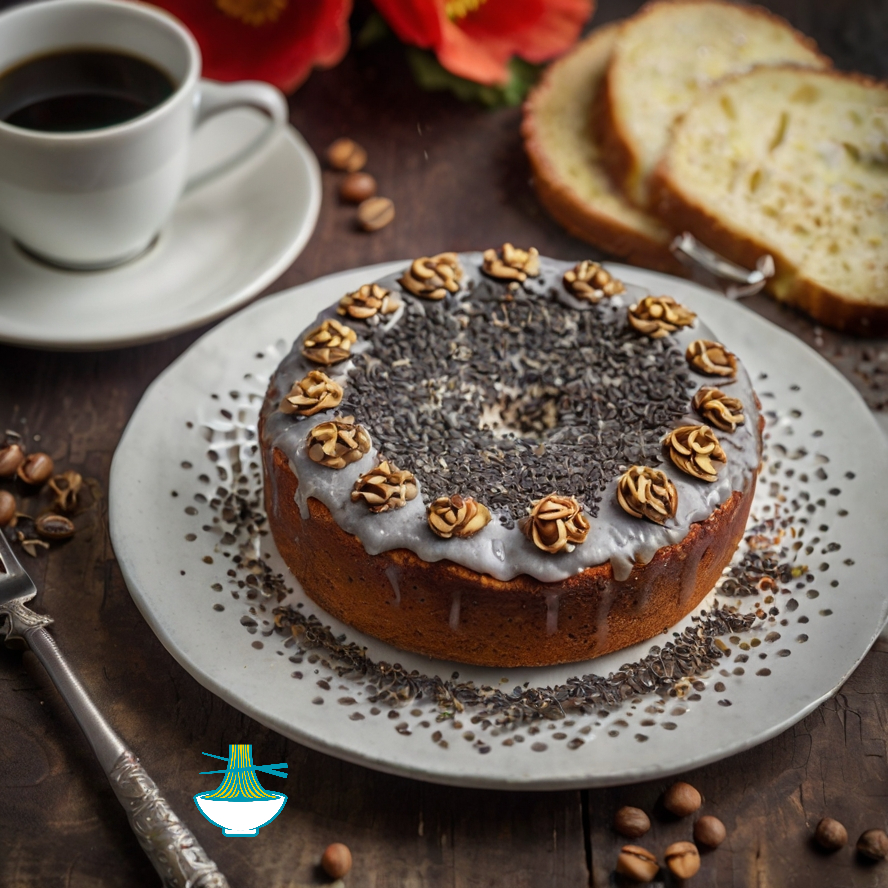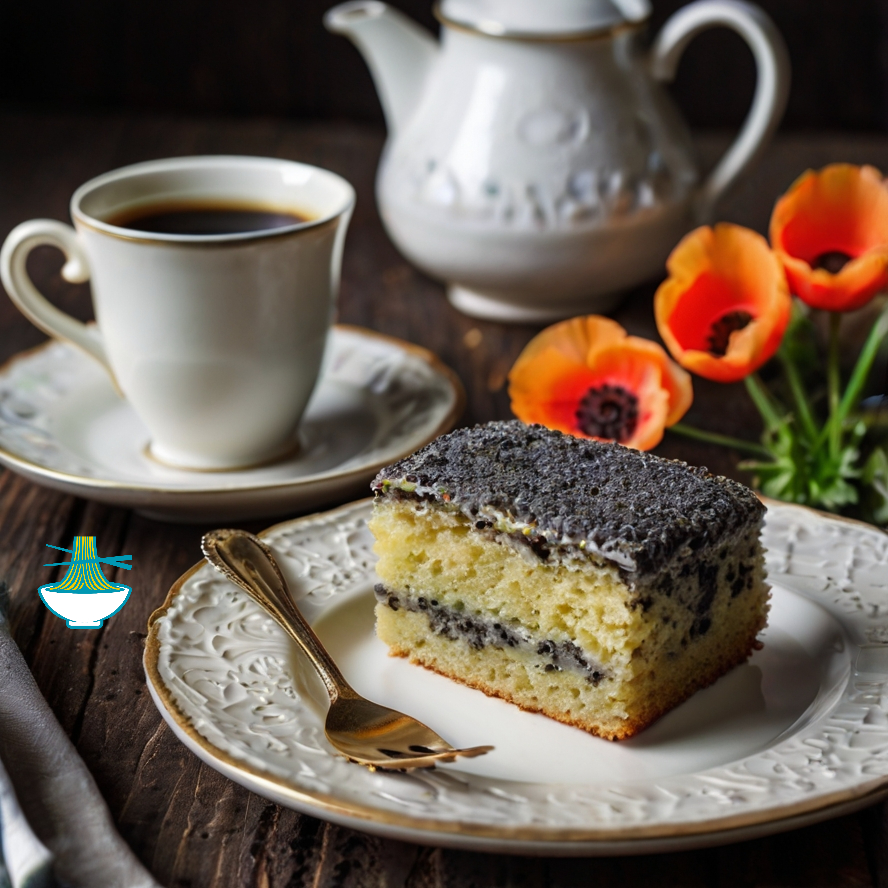Poppy Seed Cake, or Mohnkuchen, is a beloved dessert known for its rich flavor and unique texture. The star ingredient, poppy seeds, offers a delightful crunch and a nutty taste that complements the moist, lightly sweet cake. Aside from its deliciousness, this recipe provides several nutritional benefits. Poppy seeds are packed with fiber, healthy fats, and essential minerals like calcium, iron, and magnesium. These nutrients support digestive health, promote bone strength, and contribute to overall wellness. While perfect for special occasions or as a daily treat, Mohnkuchen offers a satisfying balance of nutrition and flavor.
Ingredients:
- 1 1/2 cups all-purpose flour
- 1 cup sugar
- 1 teaspoon baking powder
- 1/2 teaspoon salt
- 1/2 cup unsalted butter, softened
- 2 eggs
- 1/2 cup milk
- 1/2 cup poppy seeds
- 1 teaspoon vanilla extract
- 1/4 cup powdered sugar (optional for topping)
Instructions:
- Preheat the oven to 350°F (175°C) and grease a 9-inch round cake pan.
- In a medium bowl, mix the flour, sugar, baking powder, and salt.
- In a separate large bowl, cream together the butter and sugar until light and fluffy.
- Beat in the eggs one at a time, followed by the vanilla extract.
- Gradually add the dry ingredients to the wet ingredients, alternating with the milk, until the batter is smooth.
- Fold in the poppy seeds.
- Pour the batter into the prepared cake pan and smooth the top with a spatula.
- Bake for 30-35 minutes, or until a toothpick inserted into the center comes out clean.
- Allow the cake to cool completely before dusting with powdered sugar (optional).
- Serve and enjoy with coffee or tea.
FAQs and Their Answers:
What are alternatives to milk or butter for those with allergies?
- Milk Substitute: You can use almond milk, oat milk, or coconut milk as dairy-free alternatives. Unsweetened options are recommended to avoid altering the sweetness.
- Butter Substitute: Use margarine, coconut oil, or plant-based butter. These substitutes provide similar moisture and richness.
How can sugar be reduced or replaced for a lower-calorie version?
- Reduce sugar by 25-50% without significantly impacting taste. Alternatively, replace sugar with natural sweeteners like stevia, monk fruit, or erythritol. Honey or maple syrup can also be used, but adjust liquid ingredients accordingly.
Can the recipe be made without eggs? What are the available substitutes?
- Replace each egg with one of the following options:
- 1 tablespoon of ground flaxseed mixed with 2.5 tablespoons of water (let it sit for 5 minutes).
- 1/4 cup of unsweetened applesauce.
- 1/4 cup of mashed banana.
- Commercial egg replacers available in stores.
How long can the cake be stored? Can it be frozen?
- Storage: Keep the cake in an airtight container at room temperature for up to 3 days or refrigerate for up to a week.
- Freezing: Wrap the cake tightly in plastic wrap, then place it in an airtight container or freezer bag. It can be frozen for up to 3 months. Thaw at room temperature before serving.
Should poppy seeds be ground before use?
- Grinding poppy seeds releases more flavor and creates a smoother texture in the cake. However, it is optional and depends on personal preference.
Can a different type of flour be used?
- Yes, whole wheat flour or gluten-free all-purpose flour can be used. Whole wheat flour adds a nutty flavor, while gluten-free flour is ideal for those with gluten sensitivities.
What is the optimal baking time for different cake molds?
- For cupcakes or mini cakes, reduce the baking time to 15-20 minutes. Always check doneness with a toothpick.
Can additional flavors like cinnamon or lemon be added?
- Absolutely! Add 1 teaspoon of ground cinnamon or 1 tablespoon of lemon zest to the batter for a unique twist.
How to ensure the cake is fully baked?
- Insert a toothpick into the center of the cake. If it comes out clean or with a few crumbs, the cake is done. Avoid overbaking to maintain moisture.
Additional Tips:
Decoration Ideas:
- Dust the cake with powdered sugar or drizzle it with a simple icing made of powdered sugar and lemon juice.
- Add a sprinkle of toasted poppy seeds or almond flakes for extra texture.
Serving Suggestions:
- Pair the cake with whipped cream or vanilla ice cream for a delightful dessert.
- Serve with a dollop of fruit preserves or compote for added flavor.
Alternate Variations:
- Mini Cakes or Cupcakes: Use muffin tins to create individual servings. Adjust baking time as needed.
- Layered Cake: Slice the cake horizontally and add a filling of cream cheese frosting or fruit preserves between the layers.

Nutritional values and benefits:
1 1/2 Cups All-Purpose Flour (180g)
- Calories: 680
- Carbohydrates: 140g
- Protein: 15g
- Fat: 2g
- Sodium: 1mg
- Cholesterol: 0mg
- Vitamins:
- Folate: 60mcg (15% DV)
- Minerals:
- Iron: 4.5mg (25% DV)
- Benefit: All-purpose flour provides energy through carbohydrates and is also a source of iron, which supports blood health. It contains small amounts of folate, an essential vitamin for cell function and growth.
1 Cup Sugar (200g)
- Calories: 774
- Carbohydrates: 200g
- Protein: 0g
- Fat: 0g
- Sodium: 0mg
- Cholesterol: 0mg
- Vitamins:
- No significant vitamins
- Minerals:
- No significant minerals
- Benefit: Sugar adds sweetness to the cake and serves as a quick source of energy. It is important to consume in moderation to avoid excess calorie intake.
1 Teaspoon Baking Powder (4g)
- Calories: 6
- Carbohydrates: 1.5g
- Protein: 0g
- Fat: 0g
- Sodium: 500mg
- Cholesterol: 0mg
- Vitamins:
- No significant vitamins
- Minerals:
- Sodium: 500mg (21% DV)
- Benefit: Baking powder is used to help the cake rise. While it doesn’t provide significant nutrients, it helps in the baking process by releasing gas to make the batter light and airy.
1/2 Teaspoon Salt (2.5g)
- Calories: 0
- Carbohydrates: 0g
- Protein: 0g
- Fat: 0g
- Sodium: 1,000mg
- Cholesterol: 0mg
- Vitamins:
- No significant vitamins
- Minerals:
- Sodium: 1,000mg (43% DV)
- Benefit: Salt enhances the flavor of baked goods and helps balance the sweetness. It’s necessary for proper fluid balance and nerve function, but should be used in moderation to avoid excess sodium intake.
1/2 Cup Unsalted Butter (113g)
- Calories: 810
- Carbohydrates: 0g
- Protein: 1g
- Fat: 91g
- Sodium: 82mg
- Cholesterol: 31mg
- Vitamins:
- Vitamin A: 900 IU (18% DV)
- Minerals:
- Calcium: 31mg (3% DV)
- Benefit: Butter adds richness and flavor to Mohnkuchen. It provides vitamin A, essential for healthy skin and vision, and a good amount of fat for energy, though it should be consumed in moderation.
2 Eggs (100g)
- Calories: 140
- Carbohydrates: 1g
- Protein: 12g
- Fat: 10g
- Sodium: 140mg
- Cholesterol: 372mg
- Vitamins:
- Vitamin A: 540 IU (11% DV)
- Vitamin D: 41 IU (10% DV)
- Minerals:
- Iron: 1.4mg (8% DV)
- Benefit: Eggs are a source of high-quality protein, vitamins A and D, and essential minerals like iron. Vitamin A supports vision, while vitamin D is crucial for bone health. Eggs help build muscle and contribute to a well-rounded diet.
1/2 Cup Milk (120ml)
- Calories: 60
- Carbohydrates: 6g
- Protein: 4g
- Fat: 3g
- Sodium: 50mg
- Cholesterol: 15mg
- Vitamins:
- Vitamin A: 150 IU (3% DV)
- Vitamin D: 2.5mcg (15% DV)
- Minerals:
- Calcium: 150mg (15% DV)
- Benefit: Milk provides calcium and vitamin D, both important for maintaining strong bones and teeth. It also contains protein and small amounts of vitamin A, which supports healthy skin and vision.
1/2 Cup Poppy Seeds (80g)
- Calories: 450
- Carbohydrates: 16g
- Protein: 15g
- Fat: 38g
- Sodium: 2mg
- Cholesterol: 0mg
- Vitamins:
- Vitamin E: 1.5mg (8% DV)
- Minerals:
- Calcium: 1250mg (125% DV)
- Iron: 10mg (56% DV)
- Benefit: Poppy seeds are a powerhouse of nutrients, offering calcium and iron for bone health and blood circulation. They also provide healthy fats and fiber, contributing to overall well-being.
1 Teaspoon Vanilla Extract (5ml)
- Calories: 12
- Carbohydrates: 1g
- Protein: 0g
- Fat: 0g
- Sodium: 1mg
- Cholesterol: 0mg
- Vitamins:
- No significant vitamins
- Minerals:
- No significant minerals
- Benefit: Vanilla extract enhances the flavor of baked goods. It contains small amounts of antioxidants, which may help protect cells from oxidative damage.
1/4 Cup Powdered Sugar (optional for topping)
- Calories: 120
- Carbohydrates: 30g
- Protein: 0g
- Fat: 0g
- Sodium: 0mg
- Cholesterol: 0mg
- Vitamins:
- No significant vitamins
- Minerals:
- No significant minerals
- Benefit: Powdered sugar is used as a topping to add sweetness and improve the visual appeal of the cake. It provides a quick source of energy but should be consumed in moderation.
Nutritional Summary for One Slice (Based on 12 Slices):
- Calories: ~310
- Protein: ~5g
- Fat: ~16g
- Carbohydrates: ~38g
- Fiber: ~2g
- Calcium: ~110mg (11% DV)
- Iron: ~1.5mg (8% DV)
Summary of Nutritional Benefits:
Mohnkuchen provides a rich combination of nutrients that offer energy and essential vitamins and minerals. The poppy seeds are a key source of calcium and iron, while butter and eggs contribute healthy fats and protein. The cake is naturally sweetened with sugar and enhanced with the flavor of vanilla extract. Though this treat is indulgent, the balance of ingredients makes it a delicious, nutrient-rich option for dessert, packed with energy-boosting carbohydrates and fat.


Comments